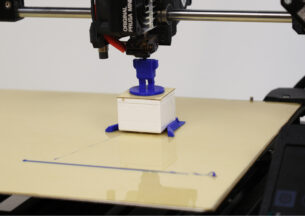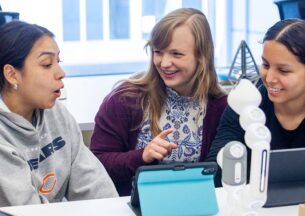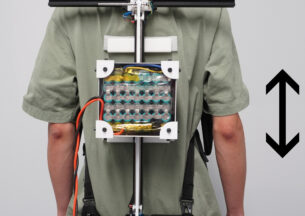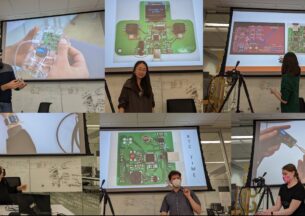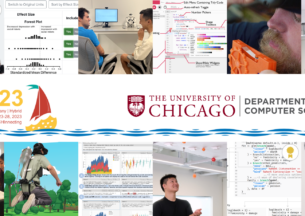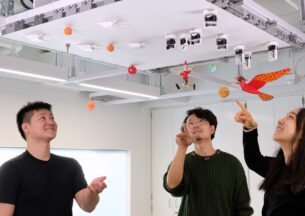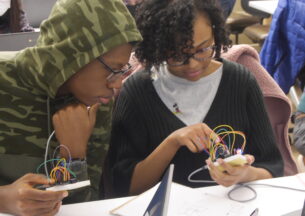University of Chicago Computer Science Researchers To Present Ten Papers at CHI 2024
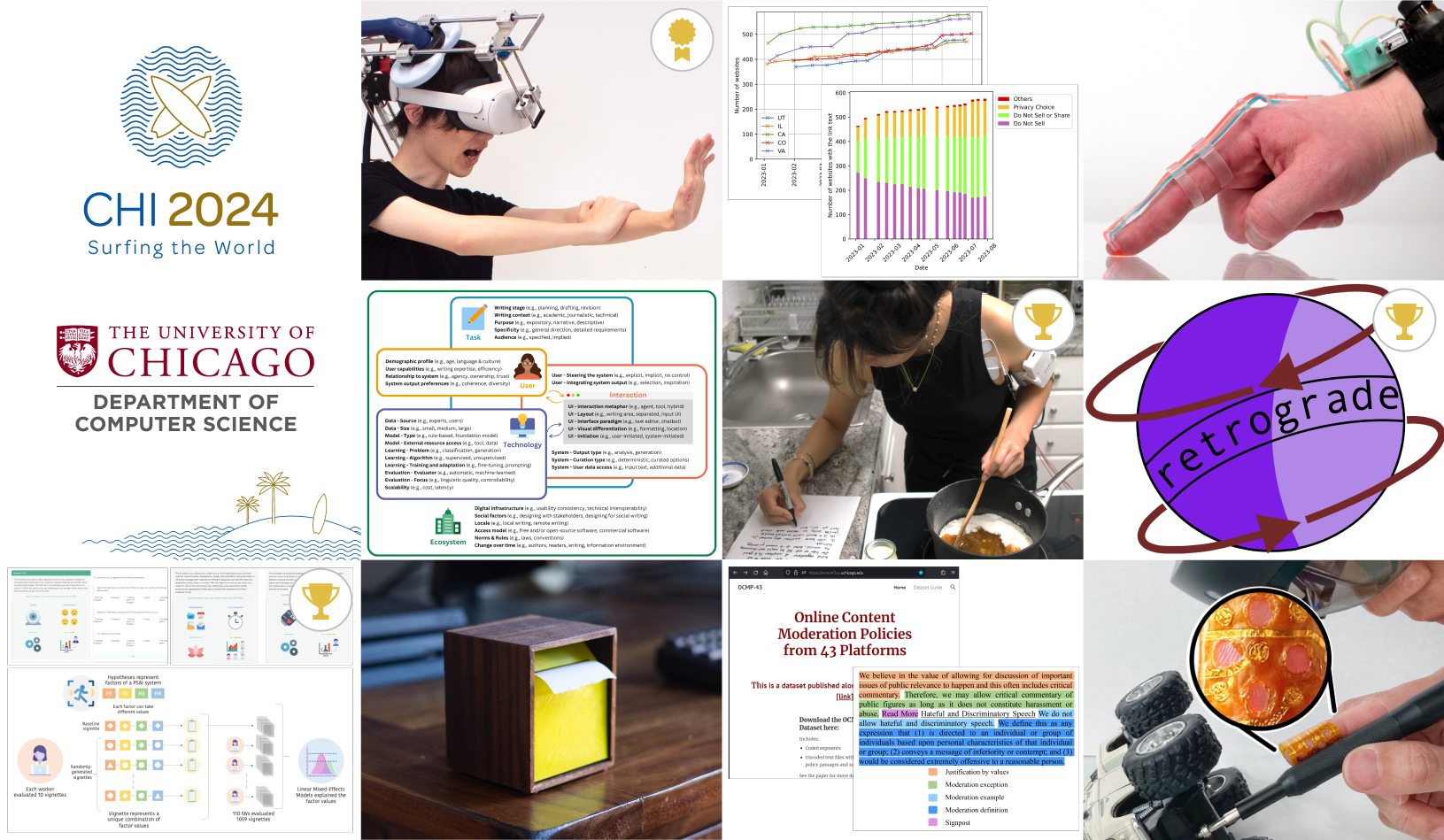
The ACM CHI Conference on Human Factors in Computing Systems is a premier international conference where researchers and practitioners gather to discuss the latest research in human-computer interaction. Held annually, CHI brings together experts from academia and industry to present groundbreaking research, share insights, and explore future directions in the field.
This year’s conference, CHI 2024, will see a remarkable showcase of innovative research from students and faculty at the University of Chicago Department of Computer Science. Three papers, including one each from Associate Professor Blase Ur’s group, Associate Professor Pedro Lopes’ group, and Associate Professor Marshini Chetty’s group, received best paper awards. Another paper from Lopes’ group also received an honorable mention.
Some works, like papers featuring Neubauer Professor Nick Feamster and Associate Professor Marshini Chetty, are also collaborations with faculty from The Law School and the Harris School of Public Policy, highlighting the interdisciplinary work that often takes place in the department. Each paper span a diverse range of topics, including contextual notifications for highlighting fairness and bias in data science, in-depth studies of online content moderation policies, investigations into compliance with privacy regulations, AI for the well-being of workers, the introduction of a design space for writing assistants, groundbreaking advancements in haptic interfaces, and innovative approaches to promoting digital well-being through leveraging material receipts for screen-time reflection. The work reflects the department’s commitment to advancing knowledge and addressing real-world challenges in the realm of computing.
Bias In Data Science
Best Paper Award
Harrison et al., 2024. JupyterLab in Retrograde: Contextual Notifications That Highlight Fairness and Bias Issues for Data Scientists.
 The paper introduces Retrograde, a JupyterLab extension designed to aid data scientists in considering algorithmic fairness during the entire data science lifecycle, from data cleaning to model building. Retrograde provides real-time, context-specific notifications to data scientists about decisions impacting fairness, such as using protected classes as predictors, handling missing data, and minimizing demographic differences in model performance. This work underscores the importance of addressing ethical considerations in data science workflows.
The paper introduces Retrograde, a JupyterLab extension designed to aid data scientists in considering algorithmic fairness during the entire data science lifecycle, from data cleaning to model building. Retrograde provides real-time, context-specific notifications to data scientists about decisions impacting fairness, such as using protected classes as predictors, handling missing data, and minimizing demographic differences in model performance. This work underscores the importance of addressing ethical considerations in data science workflows.
Although the paper has won an award, the team will be presenting the paper virtually at the conference, rather than traveling to Hawai’i, as a show of solidarity with the community’s protests over the conference’s impact on the local community.
Content Moderation
Schaffner et al., 2024. Community Guidelines Make This the Best Party on the Internet: An In-Depth Study of Online Platforms’ Content Moderation Policies.
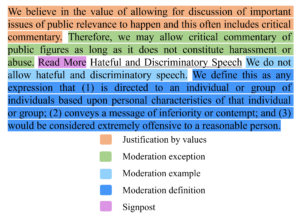 PhD student Brennan Schaffner and postdoctoral associate Arjun Bhagoji worked with a team of undergraduates under the advisory of Neubauer Professor Nick Feamster and Associate Professor Marshini Chetty, as well as Assistant Professor Chenhao Tan from the Department of Computer Science and Professor Genevieve Lakier from The Law School, to delve into the intricacies of online content moderation policies. Their in-depth study sheds light on the effectiveness and implications of platform guidelines for fostering healthy online communities. Their data set of user-generated sites’ policies on misinformation, copyright, and hate speech is also available for use by other researchers.
PhD student Brennan Schaffner and postdoctoral associate Arjun Bhagoji worked with a team of undergraduates under the advisory of Neubauer Professor Nick Feamster and Associate Professor Marshini Chetty, as well as Assistant Professor Chenhao Tan from the Department of Computer Science and Professor Genevieve Lakier from The Law School, to delve into the intricacies of online content moderation policies. Their in-depth study sheds light on the effectiveness and implications of platform guidelines for fostering healthy online communities. Their data set of user-generated sites’ policies on misinformation, copyright, and hate speech is also available for use by other researchers.
Compliance and Privacy Regulations
Tran et al., 2024. Measuring Compliance with the California Consumer Privacy Act Over Space and Time.
 Feamster and Chetty collaborate once again, this time with Professor Lior Jacob Strahilevitz from the Law School and Edwin A. and Betty L. Bergman Distinguished Service Professor Jens Ludwig from the Harris School of Public Policy. Leading the paper is PhD student Van Tran, who investigates compliance with the California Consumer Privacy Act across spatial and temporal dimensions. Their research offers valuable insights into the challenges and patterns of adherence to privacy regulations in the digital age. In particular, their work shows how regulations in California around privacy can create some spillover effects to consumers in other states.
Feamster and Chetty collaborate once again, this time with Professor Lior Jacob Strahilevitz from the Law School and Edwin A. and Betty L. Bergman Distinguished Service Professor Jens Ludwig from the Harris School of Public Policy. Leading the paper is PhD student Van Tran, who investigates compliance with the California Consumer Privacy Act across spatial and temporal dimensions. Their research offers valuable insights into the challenges and patterns of adherence to privacy regulations in the digital age. In particular, their work shows how regulations in California around privacy can create some spillover effects to consumers in other states.
AI and Worker’s Well-being
Best Paper Award
Das Swain et al., 2024. Sensible and Sensitive AI for Worker Wellbeing: Factors that Inform Adoption and Resistance for Information Workers.
 PhD student Lan Gao partnered with Georgia Institute of Technology and Northeastern University to examine the challenges and potentials of deploying Passive Sensing-enabled AI (PSAI) systems in the workplace for worker’s well-being support. To maximize PSAI’s value in the workplace while addressing worker concerns, the study dissects various components of PSAI and identifies key factors that lead to workers’ adoption and resistance to the system. Through an interactive online survey, the study finds that PSAI systems are more acceptable when sensing digital time use or physical activity rather than visual modes. Workers also show a preference for insights into mental well-being over performance metrics but resist the automatic sharing of these insights. Overall, the study provides valuable information for designing more worker-centered PSAI systems to support worker well-being and acceptance.
PhD student Lan Gao partnered with Georgia Institute of Technology and Northeastern University to examine the challenges and potentials of deploying Passive Sensing-enabled AI (PSAI) systems in the workplace for worker’s well-being support. To maximize PSAI’s value in the workplace while addressing worker concerns, the study dissects various components of PSAI and identifies key factors that lead to workers’ adoption and resistance to the system. Through an interactive online survey, the study finds that PSAI systems are more acceptable when sensing digital time use or physical activity rather than visual modes. Workers also show a preference for insights into mental well-being over performance metrics but resist the automatic sharing of these insights. Overall, the study provides valuable information for designing more worker-centered PSAI systems to support worker well-being and acceptance.
Design Space for Writing Assistants
Lee at el., 2024. A Design Space for Intelligent and Interactive Writing Assistants.
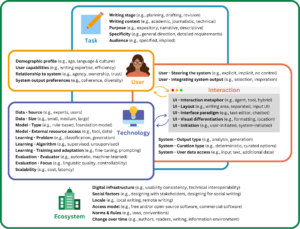 Assistant Professor Mina Lee introduces a design space for intelligent and interactive writing assistants. Through community collaboration with 36 researchers from 27 institutions and systematic literature review of 115 papers across multiple disciplines, this work explores five key aspects of writing assistants—task, user, technology, interaction, and ecosystem—and defines 35 dimensions (i.e., fundamental components of each aspect) and 143 codes (i.e., options for each dimension) as part of the design space. This work provides researchers and designers a practical reference to help them navigate, comprehend, and compare the various possibilities of writing assistants, and aid them in the design of new writing assistants.
Assistant Professor Mina Lee introduces a design space for intelligent and interactive writing assistants. Through community collaboration with 36 researchers from 27 institutions and systematic literature review of 115 papers across multiple disciplines, this work explores five key aspects of writing assistants—task, user, technology, interaction, and ecosystem—and defines 35 dimensions (i.e., fundamental components of each aspect) and 143 codes (i.e., options for each dimension) as part of the design space. This work provides researchers and designers a practical reference to help them navigate, comprehend, and compare the various possibilities of writing assistants, and aid them in the design of new writing assistants.
Pushing Boundaries in Haptic Interfaces
Best Paper Award
Nith et al., 2024. SplitBody: Reducing Mental Workload while Multitasking via Muscle Stimulation.
Honorable Mention
Tanaka et al., 2024. Haptic Source-effector: Full-body Haptics via Non-invasive Brain Stimulation.
Teng et al., 2024. Haptic Permeability: Adding Holes to Tactile Devices Improves Dexterity.
Marzursky et al., 2024. Stick&Slip: Altering Fingerpad Friction via Liquid Coatings.
The Human-Computer Integration Lab (directed by Associate Professor Pedro Lopes) makes a significant impact with not one, but four papers showcasing groundbreaking advancements in haptic interfaces:
 PhD student Romain Nith, together with co-author Yun Ho, proposes that wearables can assist people with physical multitasking—their system can, for instance, guide your hand muscles while you are cooking your meal, letting you free some physical and mental resources for other tasks, such as writing an essay with your other hand. In their CHI 2024 paper, “SplitBody” they found that moving the user’s body using electrical muscle stimulation, can alleviate the cognitive load on the user by assisting with repetitive movements. The key insight is that unlike automating tasks externally (e.g., robot arms and other machinery), with a wearable that stimulates one’s own muscles, the user is still involved in the task—giving them a sense of ownership, control and even enjoyment.
PhD student Romain Nith, together with co-author Yun Ho, proposes that wearables can assist people with physical multitasking—their system can, for instance, guide your hand muscles while you are cooking your meal, letting you free some physical and mental resources for other tasks, such as writing an essay with your other hand. In their CHI 2024 paper, “SplitBody” they found that moving the user’s body using electrical muscle stimulation, can alleviate the cognitive load on the user by assisting with repetitive movements. The key insight is that unlike automating tasks externally (e.g., robot arms and other machinery), with a wearable that stimulates one’s own muscles, the user is still involved in the task—giving them a sense of ownership, control and even enjoyment.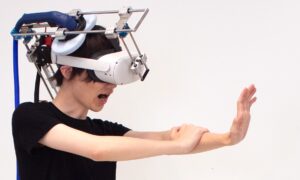 PhD student Yudai Tanaka, and co-author Jacob Serfaty, propose a completely new concept for haptic devices (e.g., interactive devices that can stimulate the sense of touch and forces, usually for increasing the quality of AR/VR immersion or training). In Yudai’s new concept, instead of having users wear devices that stimulate their skin (resulting in one device per location the user needs to feel haptic sensations), there is only one device atop the user’s brain. Using non-invasive brain stimulation (transcranial magnetic stimulation), this new single device worn in the head is able to create touch or force sensations in many locations of the body (e.g., hands, arms, legs, etc), as they describe in their CHI 2024 paper “Haptic Source-effector“. Apropos this topic, PhD student Yudai Tanaka is organizing a CHI panel with luminaries in the field of HCI and Neuroscience (e.g., Prof. Pattie Maes from the MIT Media Lab or Prof. Olaf Blanke From the Ecole Polytechnique Fédérale de Lausanne) to discuss the potential of brain-computer interfaces and brain-stimulation in HCI.
PhD student Yudai Tanaka, and co-author Jacob Serfaty, propose a completely new concept for haptic devices (e.g., interactive devices that can stimulate the sense of touch and forces, usually for increasing the quality of AR/VR immersion or training). In Yudai’s new concept, instead of having users wear devices that stimulate their skin (resulting in one device per location the user needs to feel haptic sensations), there is only one device atop the user’s brain. Using non-invasive brain stimulation (transcranial magnetic stimulation), this new single device worn in the head is able to create touch or force sensations in many locations of the body (e.g., hands, arms, legs, etc), as they describe in their CHI 2024 paper “Haptic Source-effector“. Apropos this topic, PhD student Yudai Tanaka is organizing a CHI panel with luminaries in the field of HCI and Neuroscience (e.g., Prof. Pattie Maes from the MIT Media Lab or Prof. Olaf Blanke From the Ecole Polytechnique Fédérale de Lausanne) to discuss the potential of brain-computer interfaces and brain-stimulation in HCI.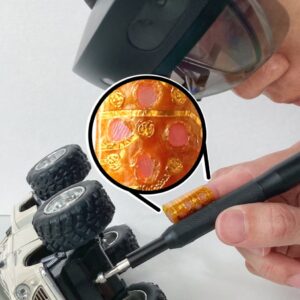 PhD student Shan-Yuan Teng, and co-author high school student Aryan Gupta, present “Haptic Permeability” in which they’ve found that adding holes to tactile devices (e.g., such as haptic devices that one wears on the finger to create virtual touch sensations) allows users to better grasp and feel objects. This advancement allows us to re-think the way that haptic devices have been engineered so far. Most devices emphasized their ability to create virtual sensations, even at the detriment to decreasing the user’s dexterity in everyday life—imagine trying to shake someone’s hand or type on a keyboard while wearing your haptic VR glove.
PhD student Shan-Yuan Teng, and co-author high school student Aryan Gupta, present “Haptic Permeability” in which they’ve found that adding holes to tactile devices (e.g., such as haptic devices that one wears on the finger to create virtual touch sensations) allows users to better grasp and feel objects. This advancement allows us to re-think the way that haptic devices have been engineered so far. Most devices emphasized their ability to create virtual sensations, even at the detriment to decreasing the user’s dexterity in everyday life—imagine trying to shake someone’s hand or type on a keyboard while wearing your haptic VR glove.- PhD student Alex Mazursky, and co-author Jacob Serfaty,
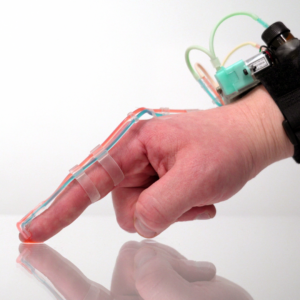 propose “Stick&Slip“, a haptic device that allows the user to feel as if the surfaces around them are changing friction. This one-of-a-kind device achieves this effect by delivering small droplets of liquids to the user’s fingerpad, just before finger touches a new surface. As these liquids have been selected for their friction coefficient and rapid evaporation, this creates a sensation of slipping or sticking to the surface. In their 2024 CHI paper they demonstrate how this enables a user to configure their finger pad’s friction in real time, for instance, allowing them a better grip while doing fine movements with a screwdriver.
propose “Stick&Slip“, a haptic device that allows the user to feel as if the surfaces around them are changing friction. This one-of-a-kind device achieves this effect by delivering small droplets of liquids to the user’s fingerpad, just before finger touches a new surface. As these liquids have been selected for their friction coefficient and rapid evaporation, this creates a sensation of slipping or sticking to the surface. In their 2024 CHI paper they demonstrate how this enables a user to configure their finger pad’s friction in real time, for instance, allowing them a better grip while doing fine movements with a screwdriver.
Tangible Intervention for Digital Well-being
Sathya et al., 2024. Attention Receipts: Utilizing the Materiality of Receipts to Improve Screen-time Reflection on YouTube.
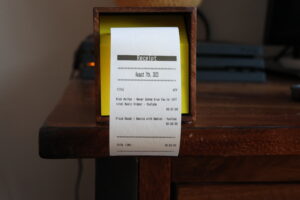 Finally, PhD student Anup Sathya, advised by Assistant Professor Ken Nakagaki from AxLab, presents a paper titled “Attention Receipts“. Modern media consumption platforms are endlessly useful and entertaining but at the same time, they are designed to maximize user engagement, often against the user’s will. In resistance, Anup designed and engineered a household object that prints receipts, materializing the user’s consumption of YouTube. Utilizing the strong cost metaphor of a receipt allows users to viscerally and critically reflect on what they ‘pay’ attention to. By deploying the object in multiple households and collating experiences from users, the authors discuss the potential of using household objects and affective data physicalization in a digital well-being context.
Finally, PhD student Anup Sathya, advised by Assistant Professor Ken Nakagaki from AxLab, presents a paper titled “Attention Receipts“. Modern media consumption platforms are endlessly useful and entertaining but at the same time, they are designed to maximize user engagement, often against the user’s will. In resistance, Anup designed and engineered a household object that prints receipts, materializing the user’s consumption of YouTube. Utilizing the strong cost metaphor of a receipt allows users to viscerally and critically reflect on what they ‘pay’ attention to. By deploying the object in multiple households and collating experiences from users, the authors discuss the potential of using household objects and affective data physicalization in a digital well-being context.
The University of Chicago Department of Computer Science continues to make significant contributions to the field of human-computer interaction, as evidenced by the diverse and impactful research that will be showcased at CHI 2024 in May. These researchers’ papers exemplify the department’s dedication to advancing knowledge, fostering innovation, and addressing pressing societal issues through computing research.




